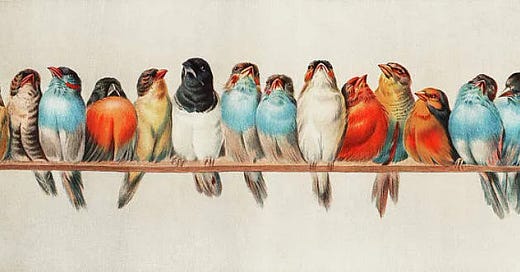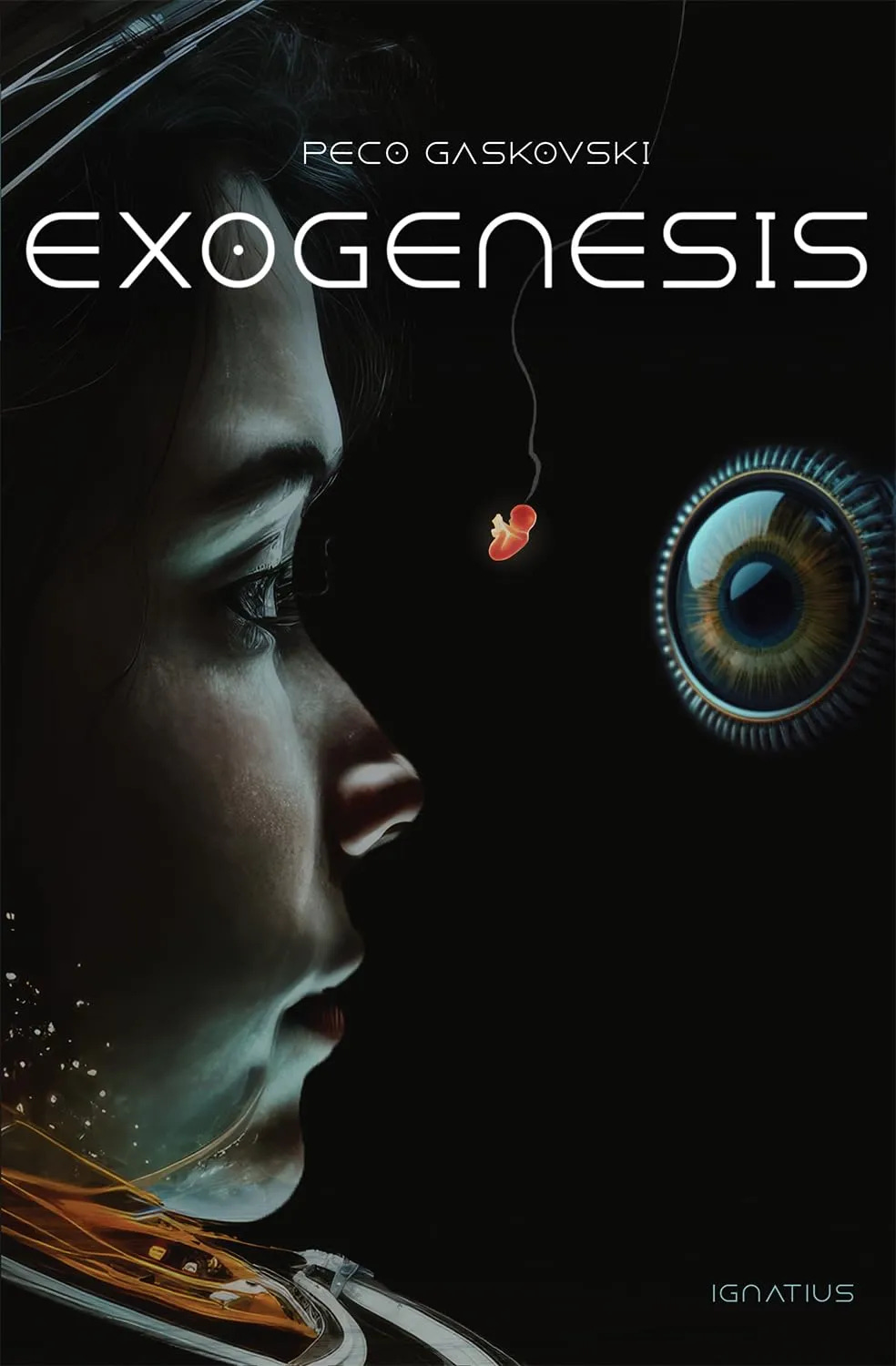Many readers have commented on the difficulty of distinguishing the “good” versus the “bad” in technology. Others have complained that “the Machine” is a poetic idea, but too vague to be of any practical use, or else is just a reactionary way of expressing pessimism about technology.
Today’s essay addresses both of these issues—and also offers a glimpse of some of the content that will (eventually) appear in The Making of UnMachine Minds, a book that my wife
and I are working on. We have included discussion questions (also in pdf) at the end of the article. Thus be sure to open this post in the web browser or app.Well, this is awkward.
The truth is, I (Peco) spend many hours each day in front of a screen, most days of the week, most days of the year. I need the screen for work, and for the two things I do outside of work—fiction writing and essay writing. I don’t use it for social media or games. I have no screen addictions. I try to print things up to read on paper, and I often use pen or pencil for early drafts of writing, and I take regular breaks away from my desk. And yet the screen, its unnatural blue glow, is intimately familiar to me, to the point that it has become a part of my being.
Not so long ago, our family went to visit extended family in another town. The journey was a few hours along a tangle of country roads that led us through low rippling hills, furrowed fields, cow pastures, forests, all of it burnished in winter sunlight. There were five of us in the car, parents in front, three kids packed tight in the back, and the conversation meandered through various topics—friends, religion, politics, random trivia, with a lot of laughter and occasional grumpy moods.
There were two phones in the car, but they weren’t being used, and we had no access to WIFI or mobile data for the entire day. It was a day free of technology, and rich in human contact; just the sort of day many of us long for.
Then something strange happened when we returned home. I took my coat and shoes off, and I went upstairs to my office, and turned on the computer, waiting as the screen lit up. I had no work to do, no emails to check or tasks to complete, and yet I was there, anticipating something in the glow of that screen, feeling the rise of some primitive foraging instinct within me, as if I were an animal about to go hunting, except my wilderness was a digital wilderness and my prey was unknown, though I sensed it was out there.
It dawned on me that I had not entirely left the screen that day. I had gone on a drive to see relatives, yes; I had been with my family; yet all the while, the lingering glow of that screen was crouched inside me. Like a ghost, the glow had followed me out of the machine, had clung to me, clung patiently, and seemed to yearn to return to the machine from whence it came. And to bring me with it.
Many people can probably relate to this experience. The ghost in the machine is increasingly becoming the ghost in our bodies. Some imagine a “transhuman” future where human beings and machines are fused into one, yet for many of us, the present fusion is already disturbing enough, and we feel anxious about how emerging technologies like AI, embodied robots, and other advances, are going to change us and our families.
Yet it would be a mistake to think the problem is merely a matter of anxiety. We’re not just timid, not just “late adopters” of technology or “gradualist” transhumans who will eventually get with the program, not just traditional, not just religious, not just stubborn Luddites. We are radars. We seem to sense things that others don’t. We have seen how devices and the internet—which were unleashed without any controls—have impacted our concentration, damaged the mental health of many of our youth, and fueled social division, and we’re concerned that the continued unleashing of new tech will further destabilize and disorient society.
And even what it means to be a “person”.

Mapping the Machine
In all the history of the earth, we are the first generation that has had to concern itself with the sheer speed of technological development. Innovation used to happen relatively slowly. Writing was invented around 3400 BC and the printing press didn’t arrive until almost 5000 years later. Today, new technologies can sweep through society so fast we have taken to calling them “disruptive”. Even the word, “disruptive”, has acquired a positive connotation, which is a bit like suggesting that frequent earthquakes and volcanic eruptions are good for gardening.
How do we see our way through the change? If we were sailing, we would need a map that showed the coastlines and the islands we were navigating, and where the storms and sea monsters tend to show up. But mapping the dark side of technology is tricky, as not everybody thinks it has a dark side, and even when they do, there can be disagreement on the extent and nature of the harm. We are dealing with new territory which is rapidly expanding.
We know that algorithms can bait our online behavior—we click, and companies make money. Digital media can also enflame our feelings and sway public opinion. Manipulation is the ocean upon which many of the new technologies float, and that ocean is laced with addictive dopamine. We are compulsively attached to the manipulation.
We have yet to see how far AI and deepfakery will take all this. We are in the midst of what some have called a fourth industrial revolution or Industry 4.0. The first revolution was driven by steam power; the second by electric power; the third by computers and the internet. The fourth is driven by big data, AI, the internet of things, robots, genetics, biotech, and more.
These “fourth industrial age technologies” could also be called the FIAT, which means “Let it be done” in Latin, as the 4.0’s may be imposed on us whether we want them or not. The FIAT will bring greater wealth to the companies that make technology, and greater power to political interests that might seek to use this technology to manage society’s values and ideological views. The West long ago rejected the alliance of Church and State, yet, with a strange blindness, seems far less worried about the deepening connections between Big Tech and political power.
However this emerging new alliance might evolve, the technologies of the FIAT will change our daily lives profoundly. We will see this change in jobs, manufacturing, education, healthcare, food, housing, energy use, vehicles, how we do financial transactions—and also in how wars are fought. Many of these changes are well underway, and for many of us, society now feels like an uprooted continent, a vast rotating territory, altering the position of the sun, moon and stars over our heads, re-ordering or else dis-ordering our basic reference points for how to live and what to believe.
All this involves changes to the structures and processes by which society goes about its business. But there is another territory, which can be more difficult to see, as it’s woven into our core nature as human beings.
Agency and Communion: Two modes of being
In 1966, psychologist David Bakan proposed that people operate through two fundamental modes of existence, Agency and Communion. Agency refers to our need to be individuals, separate and distinct from others, as expressed through mastery, power, competence, and status. Communion describes our need to be part of a larger whole and to connect with others through love, affiliation, and union. Competing for a medal in the Olympics is a more agentic goal, as is studying hard to get a good grade in an auto repair class. A psychotherapist or pastor providing counseling is a more communal action, as is a folk singer who gets the whole audience stamping their feet to the music.
Agency fulfills us through individual accomplishment; Communion fulfills us through a sense of belonging. On average, men tend to be more agentic, and women more communal, but these differences are not fixed and can be influenced by age, personality, and other factors. Even though the particular balance between the two will vary from one person to another, a certain equilibrium is needed between Agency and Communion in each of us, if we are to function as whole human beings.
Agency and Communion have been studied mainly within the field of psychology, but we can use them to describe two ways that technology can capture these distinct modes of being.
Agentic technologies tend to give us a sense of mastery or power. Examples are competitive video games, and virtual worlds that offer adventure and achievement. Possible future examples of agentic technology are brain implants or genetic engineering for increasing intelligence or health.
In contrast to agentic technologies, communal technologies are designed to connect us with others and create a sense of unity or bond—sometimes healthy, sometimes not. Examples include social media platforms (Instagram, Facebook, TikTok, X), communication platforms (phones, videoconferencing), pornography, and interactions with virtual entities like AI companions and (in the near future) embodied robots. In these cases, whatever “connection” we experience occurs either within the online reality, or with a non-real entity.
suggests that the rise in mental health problems in girls following the early 2010s was caused in part by increased social media use. This finding makes sense within the Agency/Communion framework. On average, girls tend to be more communally focused, and although social media may provide virtual experiences of connection, these experiences—being simulated and not actual—cannot fully or properly fulfill a person’s needs for Communion, resulting in a distortion of emotional functioning.Boys have also suffered from rising mental health issues, but in this case the difficulty may (on average) be more associated with a failure to express Agency in the real world, and instead to spend too much time in virtual games and simulated realities that can’t provide them with true experiences of risk and triumph.
Again, these “average” differences tend to overlap at the level of individuals, as each of us has needs in both Agency and Communion. The bigger take-home message is that there is likely a tipping point—which varies from person to person—for how much time we can spend living through agentic and communal technologies before we start to experience symptoms, side effects, and other harms. A point at which we function too little like human beings, and too much like ghosts in machines.
Ethan’s story
Ethan is fifteen and gets bullied by some of the boys in his class. But that might not be the worst of it. The worst might be some of the girls. One day the girls decide they’re going to make Ethan believe that they like him, so they start saying things and acting in ways to make him fall for it. He does fall for it, and at that moment the girls viciously turn on him with laughter and mockery.
The experience is crushing. Ethan doesn’t trust girls anymore and doesn’t trust anybody. But we can’t blame him for being naive. He might be fifteen, but he also has an intellectual disability, which makes it harder for him to differentiate truth from lies.
One night, Ethan’s mother brings him to an informal gathering of families in the basement of a local church. The teens are hanging out, some chatting, others exercising in the gym room, but Ethan doesn’t want any part of it. He sits with his mother, afraid and timid. He occupies himself with his smartphone. At least his smartphone won’t bully him.
Ethan might one day be provided with an AI assistant in his phone, which could talk to him like a friend. We can imagine even more powerful technologies, like an AI-based robot companion who “hangs out” with Ethan in the real world. This companion will never reject him, and will let him win all the competitive games they play. In this way, the robot could give Ethan the experience of Communion and Agency—although some might call those experiences false or cheapened. The real world includes the possibility of rejection. It includes losing and not just winning.
Taking things a step further, in the not-too-distant future brain implants may be used to enhance the intellectual functioning of individuals like Ethan, which could lift his mental level, making him more equivalent to his peers.
Of course, if Ethan can get a brain implant, then his peers might be able to get them too, allowing them to leapfrog beyond his intellectual level, and to once again leave him feeling like an “inferior”. There’s also a risk these implants might include algorithm-driven inputs that sway people’s emotional and social behaviors, just as many digital platforms do today. Does Ethan want to risk direct-to-brain manipulation, in exchange for whatever benefits—and unpredictable outcomes—might follow?
What Ethan wants, what he needs, are real experiences of mastery and triumph in the world, and real experiences of connection with actual people. He needs Agency and Communion to be whole.
How do we help move Ethan in the right direction? How do we help our own children and ourselves in a world of tempting technologies?
Seeing with the eyes of a songbird
Songbirds may be able to see magnetically. Electrons within a unique molecule in their eyes may act like little magnets and serve as an internal compass, possibly allowing the birds to see darker and lighter shades that correspond to the Earth's magnetic field lines, and in this way helping them to fly true when they migrate across continents, through storms and across deserts.
We need a compass too, of a different kind. Screens, AI, and other new technologies invite us to integrate more fully with technology itself, to migrate more deeply into the territory of the Machine. We aren’t birds, yet we’re caught in a global cognitive migration that, to many, feels awfully unnatural.
We don’t have an inborn compass that operates through the quantum spin dynamics of electrons in our eyes, but when it comes to technology, we can cultivate a “songbird sense” of direction that points us toward real experiences of Agency and Communion, and away from sub-real experiences.
For each new technology offered to us, we can ask:
– In terms of Agency, does this technology point toward experiences of mastery, power, and control in the real world, or does it point toward virtual substitutes for these experiences?
– In terms of Communion, does this technology point toward connections with real people, or instead toward virtual people, or digital or robotic entities?
We might discover nuance in our answers. Sometimes social media is a rabbit hole leading to wasted hours or unhealthy encounters; sometimes it’s a place to discover essays or fiction that actually exercise our minds, or maybe a practical way for friends to discuss plans for an in-person get together.
We can also ask compass questions in terms of time:
– How many hours a day do I spend on technology? At what point do I reach a “tipping point”, when I know I’ve been on too long?
Obviously many people can play video games or use social media without developing a mental health disorder. Sometimes technology is simply entertainment. From Latin, the word “entertainment” comes from inter (among or between) + teneō (hold), suggesting to “hold or keep” our attention and amusement between something else—perhaps the other part of our lives. That “holding” was never meant to be a permanent state of mind. Spending too much time on any kind of technology, even “good technology”, can end up being harmful.
Western society has created an expectation that we must constantly be entertained. It wasn’t always so. When I was a boy, the idea that my parents would set aside time to play with me rarely crossed my mind. As working immigrants with little free time, they were more likely to enlist me in a chore or just drag me along to wherever they were going with no promises of fun. My mother occasionally went clothes shopping, and I remember weary hours following her through store aisles, bored out of my wits and wandering into racks of dresses and trousers pretending I was exploring caves.
But these experiences of boredom, although unpleasant at the time, resulted in an accidental virtue: they balanced my expectations about life. Life wasn’t all about me, wasn’t all about emotional self-customization, as much as I wanted it to be (and instinctively still do!). The answer is not to go back in time, but to become aware of how much we expect to entertain ourselves—to allow ourselves to be “held” or “kept” in a suspended state of pleasure—and to question whether this is good for us.
While not everybody is susceptible to entertainment technologies, there is a risk that we will produce a society which, to some degree, will be over-screened, over-augmented, and disconnected from ordinary reality. A sub-society of digital ghettos where digital slum dogs dwell, rich in technology but impoverished in real Agency and real Communion.
The virtues of failure
Our younger son builds remote-controlled airplanes using foam, glue, electric motors, and a box cutter. For a while he built the planes using premade kits, but then he decided to design his own. The problem was, he refused to fly them. He had a basement full of beautiful planes that had never flown.
“Come on, let’s try one,” I would suggest.
“No!” he would say.
“Why not?”
“I just don’t want to.”
I knew him well enough to guess he was afraid his planes would crash and be ruined. More than that, I sensed he feared the humiliation of failure.
At last, I managed to convince him to take his latest plane for a test flight. It only had a front propeller and no wing flaps, so there was no intention of trying to take it too high off the ground. The goal was just to see if it would even get off the ground and glide straight for a short distance.
We headed out to the park, and though it had snowed a little, the weather was clear. He held the wireless controller in one hand and accelerated the propeller, and then, on his signal, I tossed the plane into the air. We managed a couple of short glides, but on the final try, he accelerated against a downwind, causing the plane to nosedive into the frozen ground, shattering the propeller and cracking the fuselage. I thought he would be distraught. Instead he said, “It’s okay, I’m already working on a better one.”
How did he get to the point where the fear of failure and humiliation didn’t matter? Although I did encourage him to take the risk, I never forced him. The decision had to be his, not mine.
Taking risks helps us grow, yet the risk and possibility of failure has to unsettle us a little, even hurt and break something down in us, so that something stronger can be built up in its place. We can get that in real life, but not from virtual technologies that, by their design, transport us to realities where the risk isn’t real. Real life can break our planes, our bones, our relationships, and much else. It’s not pleasant, but if nothing is broken down, nothing can be built up.
The most remarkable thing about the story of my son is that it’s completely unremarkable. Mother birds cajole their hatchlings to leap out of the nest and fly; parents have cajoled their children to leap into reality for millennia. The danger of the new technologies is that they can rob us of an essential leap of faith into experiences that make us truly human, whether by giving us mastery over challenges, or developing a sense of belonging with others.
Seeking wholeness
A good songbird compass helps us see that technology isn’t harmful if its primary impact is to point us back to reality rather than pointing back to the technology itself. There is an analogy to religion here. Religion can go wrong in many ways, and one of those ways is when it becomes so narrow that it keeps pointing us back to the religion itself, rather than to reality as a whole, which is its proper role: to exercise our awareness and ability to respond to the totality of things, both the natural (earth, self, others) and the supernatural (God).
When technology points us back to itself, it functions in a limiting and even cultish way, demanding more and more of our time, our attention, our relationships, and our money, until we are so slavishly dependent that we have difficulty seeing how anybody without our technological advantages could possibly be happy.
If technology can border on the cultish and spiritual, then we can see why it can make people with spiritual beliefs uneasy. When Director James Cameron tried the Apple Vision Pro VR goggles for the first time, he was blown away. “My experience was religious,” he said. Another commentator also reacted with spiritual language: “It’s incredible! You can feel a vibration in the universe!”
Within both the Jewish and Christian religious traditions, human beings are created in God’s “own image”. From this perspective, agentic and communal technologies are problematic not only as they can distort two major modalities of human functioning, but because they can create experiences that mislead our spiritual perceptions.
Not all of us are traditionally religious, yet there is a wholeness to each of our lives, a completeness of being, that isn’t reducible to its separate parts, that’s wondrously greater than the sum of these parts. It’s easy to pick out the kinds of technology that are patently harmful—like videogame or pornography addiction—but harder to step back from our lives and from technology itself, to appreciate its more total impact.
In 1991 Mark Weiser observed that “the most profound technologies are those that disappear. They weave themselves into the fabric of everyday life until they are indistinguishable from it.” Since the advent of the internet, a lot of our technology, though incredibly powerful, has become incredibly invisible to us. We can’t see the big picture of its impact just by taking a few minutes to analyze our tech use.
We need to detach the fabric of technology from the fabric of who we are. Yet to do this, we may need to step back from our usual way of living, to make the invisible visible again. This could mean radically reducing or abstaining—fasting from—certain forms of tech long enough to discover the experience of what life is like without it.
The second step of the 3Rs (which
and I have written about here) is Remove, and sometimes nothing less than removal will allow us to see how much technology has changed us. We might also get to this point by cultivating more daily silence in our lives, as suggested by , or through other practices that keep us away from tech. Developing our songbird compass to the fullest may demand changes in parts of our lifestyle.Even with a good compass, the reality for most of us is that we will need technology and machines in our lives, though the degree will vary from person to person—maybe even from society to society. The real choice is not whether we become “people of the earth” or “people of the machine”, but whether we remain people of the earth who use machines wisely or whether we become consumed by the machines and unrecognizable as people.
That night in the church basement, the teens were astute enough to see Ethan’s reality. Several of them approached him with openness and patience, and invited Ethan to join them in their exercise program, which included running laps around the church building, even though the evening was cold and dark. He was reluctant, avoiding eye contact, not trusting them. He sensed a trick of some kind.
But in the end, through their friendly encouragement, Ethan joined them. He was a bit heavyset, and probably hadn’t run like this in a long time. Maybe never. But he came back to the church basement beaming and spent the rest of the evening hanging out with the teens in the gym room.
“I like them,” he later told his mother. “I want to come back here again.”
Building a Songbird Compass:
Questions for Discussion and Reflection
We can encourage ourselves to think critically around three different areas of technology use: Society, Person, and Spirituality. Below are questions we can ask for each area to develop an inner compass for healthier tech use.
SOCIETY
Is this technology monetizing my online behavior? Do I understand the extent of the monetizing? Is that acceptable for me or for my children?
Is this technology manipulating (biasing) my social or political beliefs, values, or worldview in an unwanted way?
Does the bias involve strategic omission, where relevant information isn’t mentioned or downplayed? Or is it a bias of misinformation (false information)?
Are there other technologies (media, social media, search engines, etc.) that are less manipulative?
PERSON
In terms of Agency:
Does this technology point me to experiences of mastery, power, and competence in the real world, or does it point me to virtual substitutes for these experiences using simulations and devices?
Does this technology strengthen my concentration and other mental abilities or skills, or does it cause me to become overly dependent on digital assistants and other tech “crutches” to do my thinking or creativity for me?
Does this technology strengthen my physical body or physical skills in the real world, or does it encourage a sedentary way of life?
In terms of Communion:
Does this technology point me toward connections with real people, or instead with virtual people, or digital or robotic entities?
Does this technology bring me closer to family, extended family, friends, and people in my workplace and local community, or instead does it encourage relationships that are virtual, transient, or AI-based?
Too much technology use, even if it supports Agency and Communion in the real world, can lead to a “tipping point” when it becomes harmful. Questions we can ask include:
How many hours a day do I spend experiencing life through technology?
At what point do I reach a “tipping point”, when I know I’ve been using the technology for too long? Is this tipping point the true tipping point, or has it lengthened gradually over time? Do I need to recalibrate the definition of “normal” tech use in my life?
SPIRITUALITY (or Wholistic Impact)
What is the definition of “reality” according to my spiritual or philosophical understanding? Does the technology I’m using point me toward this reality, or away from this reality?
What is the spiritual or philosophical significance of body, mind, heart, morality, relationships, language, reason, emotions, nature, creativity, God?1 Does the technology I’m using support any areas of significance, or does it distort or weaken my commitment to important areas?
Am I taking enough time away from certain forms of technology long enough to discover the experience of what life is like without it? Are there types of tech use in my lifestyle that might have to be radically minimized or permanently removed, in order to preserve and cultivate something essential in who I am as a human being?
What questions would you add to the Songbird Compass?
We would love to hear from you! Please share your reflections in the comments section below.
If you found this post helpful (or hopeful), and if you would like to support our work of putting together a book on “The Making of UnMachine Minds”, please consider supporting our work by becoming a paid subscriber, or simply show your appreciation with a like, restack, or share.
For readers of fiction, my novel Exogenesis imagines a technological future where a parallel rural society has arisen beside a technologically advanced city, giving it the feel aptly described by one reviewer of Blade Runner meeting The Benedict Option.
Thanks to Ellis Potter who emphasizes many of these categories as being cores parts of “spirituality”.














I like to juxtapose all of my experience with technology onto my most basic 'piece' of technology - my cast iron claw hammer. My hammer extends my natural ability to concentrate directed force. It serves me rather than I, it. Whenever I start to feel uneasy about the intrusive nature of some tech I am using I ask myself "what would it be like if my hammer did that?"
What if every time I picked up picked up my hammer to hit a nail I had to sit through a 5 second advertisement about screwdrivers and wrenches?
What if my hammer stopped working for 5 minutes each week while it 'updated'?
This helps me to distinguish technology that I hold from technology that is attempting grasp me.
Note: I'm typing this comment after only reading part of the article as I didn't want to lose my train of thought ...back to reading now :)
Another great piece, Peco. Coming from a 'hands-on is healthiest' background, a question I would add is something along the lines of: 'How is my use of this technology keeping me from doing embodied things in the physical world, using a variety of tools and methods, rather than one tool and method, electronically or virtually?'
My concern is, for myself included, that all these plastic and glass surfaces have dumbed me haptically. I am currently medicating with chopping board and vegetables.